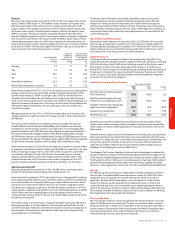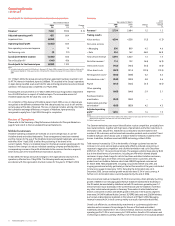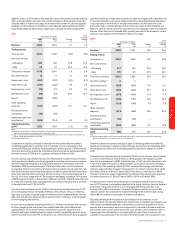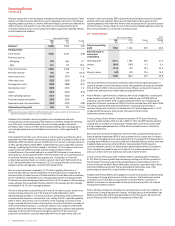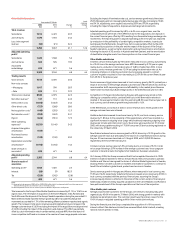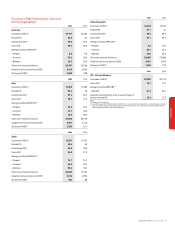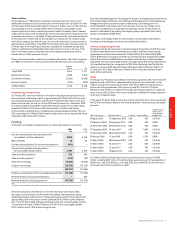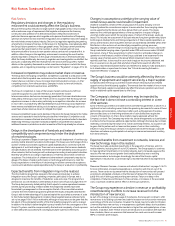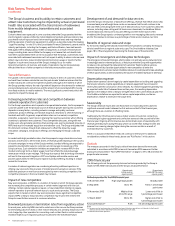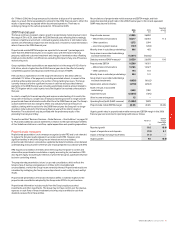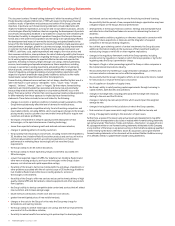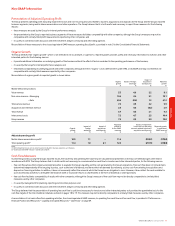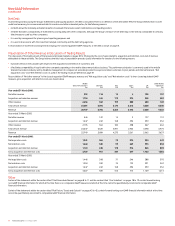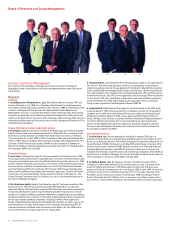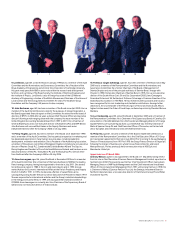Vodafone 2006 Annual Report Download - page 43
Download and view the complete annual report
Please find page 43 of the 2006 Vodafone annual report below. You can navigate through the pages in the report by either clicking on the pages listed below, or by using the keyword search tool below to find specific information within the annual report.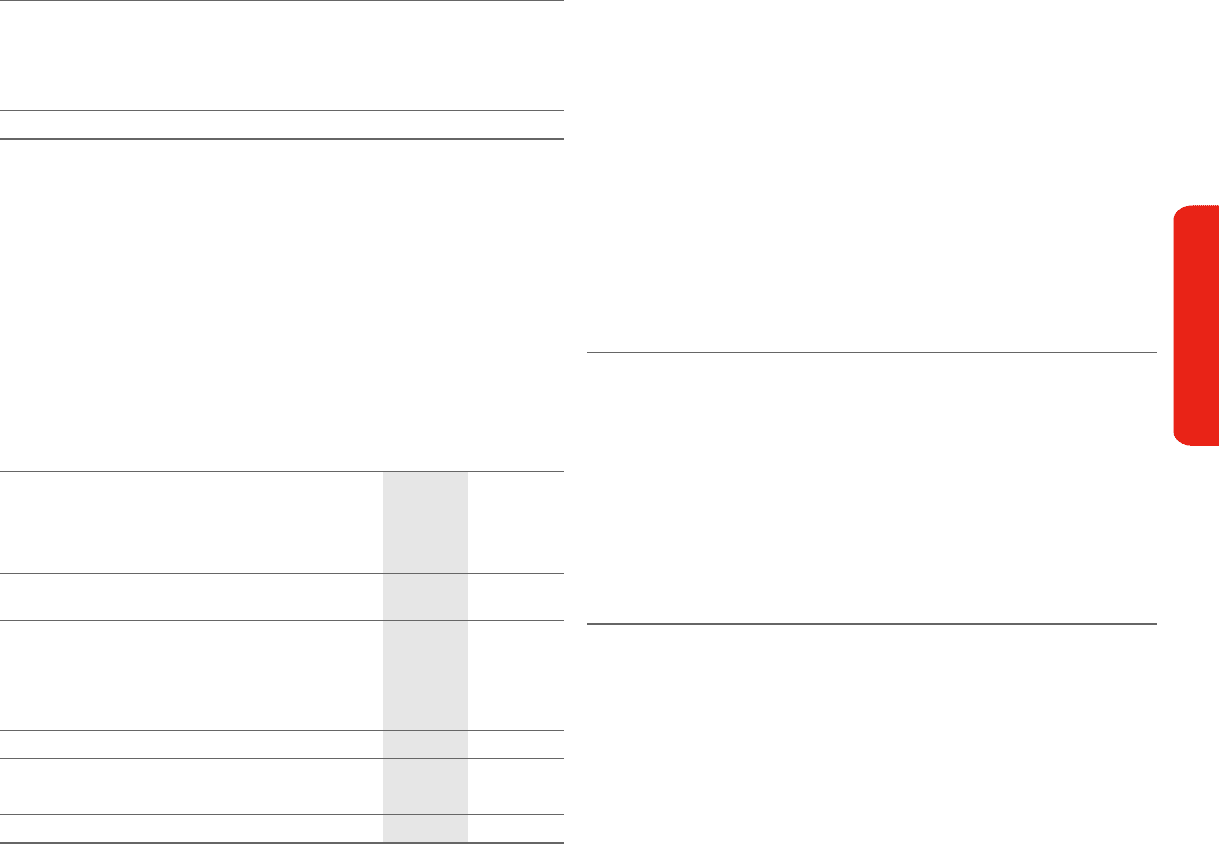
Vodafone Group Plc Annual Report 2006 41
Treasury shares
The Companies Act 1985 permits companies to purchase their own shares out of
distributable reserves and to hold shares with a nominal value not to exceed 10% of the
nominal value of their issued share capital in treasury. If shares in excess of this limit are
purchased they must be cancelled. Whilst held in treasury, no voting rights or pre-
emption rights accrue and no dividends are paid in respect of treasury shares. Treasury
shares may be sold for cash, transferred (in certain circumstances) for the purposes of an
employee share scheme, or cancelled. If treasury shares are sold, such sales are deemed
to be a new issue of shares and will accordingly count towards the 5% of share capital
which the Company is permitted to issue on a non pre-emptive basis in any one year as
approved by its shareholders at the AGM. The proceeds of any sale of treasury shares up
to the amount of the original purchase price, calculated on a weighted average price
method, is attributed to distributable profits which would not occur in the case of the
sale of non-treasury shares. Any excess above the original purchase price must be
transferred to the share premium account.
Shares purchased are held in treasury in accordance with section 162 of the Companies
Act 1985. The movement in treasury shares during the financial year is shown below:
Number
million £m
1 April 2005 3,814 5,121
Repurchase of shares 4,848 6,500
Cancellation of shares (2,250) (3,053)
Re-issue of shares (279) (370)
31 March 2006 6,133 8,198
Vodafone Italy share purchase
On 19 April 2005, the board of directors of Vodafone Italy approved a proposal to buy
back issued and outstanding shares for approximately €7.9 billion (£5.4 billion), which
was subsequently approved by the shareholders of Vodafone Italy. The buy back took
place in two tranches, the first on 24 June 2005 and the second on 7 November 2005.
As a result, Vodafone received €6.1 billion (£4.2 billion) and Verizon Communications
received €1.8 billion (£1.2 billion). After the transaction, Vodafone and Verizon
Communications shareholdings in Vodafone Italy remained at approximately 77% and
23%, respectively. At 31 March 2006, Vodafone Italy had net cash on deposit with Group
companies of €2.3 billion (£1.6 billion).
Funding
The Group’s consolidated net debt position for continuing operations is as follows:
2006 2005
£m £m
Cash and cash equivalents (as presented in the
consolidated cash flow statement) 2,932 3,726
Bank overdrafts 18 43
Cash and cash equivalents for discontinued operations (161) –
Cash and cash equivalents (as presented in
the consolidated balance sheet) 2,789 3,769
Trade and other receivables(1) 310 408
Trade and other payables(1) (219) (79)
Short-term borrowings (3,448) (2,003)
Long-term borrowings (16,750) (13,190)
(20,107) (14,864)
Net debt as extracted from the consolidated balance sheet (17,318) (11,095)
Net debt related to discontinued operations –920
Net debt related to continuing operations (17,318) (10,175)
Note:
(1) Trade and other receivables and payables include certain derivative financial instruments (see notes 17 and 27).
Net debt increased to £17,318 million, from £10,175 million at 31 March 2005,
principally as a result of the cash flow items noted above, share purchases, equity
dividend payments and £34 million of foreign exchange movements. This represented
approximately 24% of the Group’s market capitalisation at 31 March 2006 compared
with 11% at 31 March 2005. Average net debt at month end accounting dates over the
12 month period ended 31 March 2006 was £13,391 million, and ranged between
£9,551 million and £17,318 million during the year.
Consistent with development of its strategy, the Group is now targeting low single A long
term credit ratings from Moody’s, Fitch Ratings and Standard & Poor’s having previously
managed the capital structure at single A credit ratings. Credit ratings are not a
recommendation to purchase, hold or sell securities, in as much as ratings do not
comment on market price or suitability for a particular investor, and are subject to
revision or withdrawal at any time by the assigning rating organisation. Each rating
should be evaluated independently.
The Group’s credit ratings enable it to have access to a wide range of debt finance,
including commercial paper, bonds and committed bank facilities.
Commercial paper programmes
The Group currently has US and euro commercial paper programmes of $15 billion and
£5 billion, respectively, which are available to be used to meet short term liquidity
requirements and which were undrawn at 31 March 2005. At 31 March 2006, $696
million (£400 million) was drawn under the US commercial paper programme and $80
million (£46 million) and £285 million were drawn under the euro commercial paper
programme. The commercial paper facilities are supported by $10.9 billion (£6.3 billion)
of committed bank facilities, comprised of a $5.9 billion Revolving Credit Facility that
matures on 24 June 2009 and a $5.0 billion Revolving Credit Facility that matures on
22 June 2012. At 31 March 2006 and 31 March 2005, no amounts had been drawn
under either bank facility.
Bonds
The Group has a €15 billion Euro Medium Term Note programme, a $12 billion US shelf
programme and a ¥600 billion Japanese shelf programme, which are used to meet
medium to long term funding requirements. At 31 March 2006, the total amounts in
issue under these programmes split by currency were $13.4 billion, £1.5 billion,
€8.7 billion and ¥3 billion. In addition, the Group’s discontinued operation in Japan had
bonds in issue of ¥125 billion, which were transferred to SoftBank following completion
of the sale of Vodafone Japan.
In the year to 31 March 2006, bonds with a nominal value £5.2 billion were issued under
the US Shelf and the Euro Medium Term Note programme. The bonds issued during the
year were:
US Shelf / Euro
Medium Term
Note (“EMTN”)
Date of bond issue Maturity of bond Currency Amount Million programme
8 August 2005 15 September 2015 USD 750 US Shelf
8 September 2005 8 September 2014 GBP 350 EMTN
29 November 2005 29 November 2012 EUR 750 EMTN
29 December 2005 29 June 2007 USD 1,850 US Shelf
29 December 2005 28 December 2007 USD 750 US Shelf
8 February 2006 17 July 2008 EUR 1,250 EMTN
16 March 2006 28 December 2007 USD 750 US Shelf
16 March 2006 15 June 2011 USD 350 US Shelf
16 March 2006 15 June 2011 USD 750 US Shelf
16 March 2006 15 March 2016 USD 750 US Shelf
At 31 March 2006, the Group had bonds in issue with a nominal value of £15,389
million, including $207 million of bonds that were assumed as part of the acquisition of
MobiFon S.A. and Oscar Mobil a.s. on 31 May 2005, plus a further ¥125 billion bonds in
the Group’s discontinued operations in Japan.
Performance


